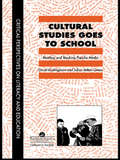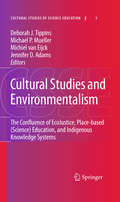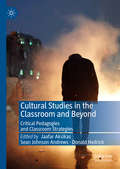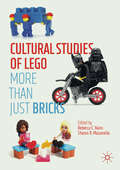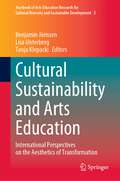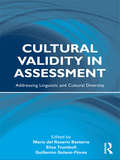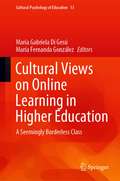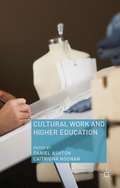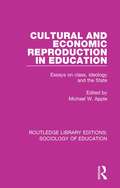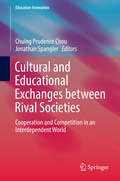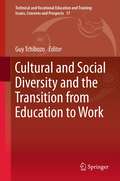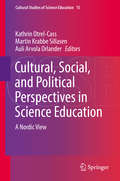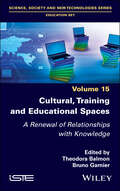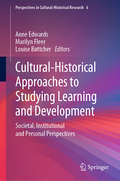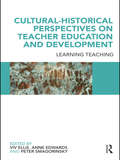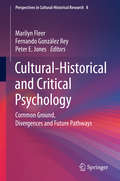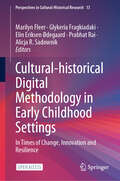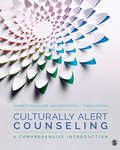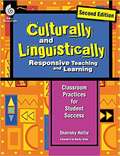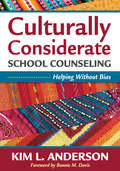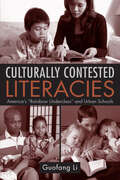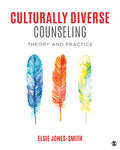- Table View
- List View
Cultural Studies Goes To School: Reading And Teaching Popular Media (Critical Perspectives On Literacy And Education Ser.)
by Julian Sefton-Green David BuckinghamFirst Published in 1994. Routledge is an imprint of Taylor & Francis, an informa company.
Cultural Studies and Environmentalism: The Confluence of EcoJustice, Place-based (Science) Education, and Indigenous Knowledge Systems (Cultural Studies of Science Education #3)
by Michiel Van Eijck Jennifer D Adams Michael P. Mueller Deborah J. TippinsAs the first book to explore the confluence of three emerging yet critical fields of study, this work sets an exacting standard. The editors' aim was to produce the most authoritative guide for ecojustice, place-based education, and indigenous knowledge in education. Aimed at a wide audience that includes, but is not restricted to, science educators and policymakers, Cultural Studies and Environmentalism starts from the premise that schooling is a small part of the larger educational domain in which we live and learn. Informed by this overarching notion, the book opens up ways in which home-grown talents, narratives, and knowledge can be developed, and eco-region awareness and global relationships can be facilitated. Incorporating a diversity of perspectives that include photography, poetry and visual art, the work provides a nuanced lens for evaluating educational problems and community conditions while protecting and conserving the most threatened and vulnerable narratives. Editors and contributors share the view that the impending loss of these narratives should be discussed much more widely than is currently the case, and that both teachers and children can take on some of the responsibility for their preservation. The relevance of ecojustice to this process is clear. Ecojustice philosophy is a way of learning about how we frame, or perceive, the world around us--and why that matters. Although it is not synonymous with social or environmental justice, the priorities of ecojustice span the globe in the same way. It incorporates a deep recognition of the appropriateness and significance of learning from place-based experiences and indigenous knowledge systems rather than depending on some urgent "ecological crises" to advocate for school and societal change. With a multiplicity of diverse voices coming together to explore its key themes, this book is an important starting point for educators in many arenas. It brings into better focus a vital role for the Earth's ecosystems in the context of ecosociocultural theory and participatory democracy alike. "Encompassing theoretical, empirical, and experiential standpoints concerning place-based knowledge systems, this unique book argues for a transformation of (science) education's intellectual tradition of thinking that emphasizes individual cognition. In its place, the book offers a wisdom tradition of thinking, living, and being that emphasizes community survival in harmony within itself and with Mother Earth." Glen Aikenhead
Cultural Studies in the Classroom and Beyond: Critical Pedagogies and Classroom Strategies
by Jaafar Aksikas Sean Johnson Andrews Donald HedrickThis edited volume seeks to combine and highlight the theoretical and practical aspects of teaching by exploring and reflecting on the ways in which Cultural Studies is taught and practiced at both the undergraduate and graduate levels, in the US and internationally. Contributors create a space where connections among Cultural Studies practitioners across generations and locations are formed. Because the alliances built by Cultural Studies practitioners in the U.S. and the global north are deeply shaped by the global south/Third World perspectives, this book extends an invitation to teachers and practitioners in and outside of the US, including those who may offer a transnational perspective on teaching and practicing Cultural Studies. This volume promises to be a trailblazing collection of first-rate essays by leading and emerging figures in the field of Cultural Studies.
Cultural Studies of LEGO: More Than Just Bricks
by Rebecca C. Hains Sharon R. MazzarellaThis collection examines LEGO from an array of critical and cultural studies approaches, foregrounding the world-renowned brand's ideological power and influence. Given LEGO’s status as the world’s largest toy manufacturer and a transnational multimedia conglomerate, Cultural Studies of Lego: More Than Just Bricks considers LEGO media's cultural messages; creativity with and within LEGO artifacts; and diversity within the franchise, including gender and race representation. The chapters’ in-depth analyses of topics including LEGO films, marketing tactics, play sets, novelizations, and fans offer compelling insights relevant to those interested in the LEGO brand and broader trends in the children’s popular culture market alike.
Cultural Sustainability and Arts Education: International Perspectives on the Aesthetics of Transformation (Yearbook of Arts Education Research for Cultural Diversity and Sustainable Development #2)
by Benjamin Jörissen Lisa Unterberg Tanja KlepackiThis book is based on the topics, questions and results of the international conference "Aesthetics of Transformation - Arts Education Research and the Challenge of Cultural Sustainability". It aims to foster and sharpen the understanding of the potential role of arts education and arts education research for cultural sustainability. In an ever more complex and interconnected world, culture is a valuable resource for sustainable development. Based on the thesis that the change towards sustainability has to be a change that starts with cultural practices of perception and knowledge, this book makes an important contribution to the broad discourse on cultural sustainability, which has begun to emerge in recent years.In this context, the volume first deals with Intangible Cultural Heritage and how aesthetic practices and certain forms of art are changing through cultural transformation processes. Subsequently, it focuses on issues such as arts and cultural education in times of neoliberalism, (post-)migration and post-coloniality as well as on arts and cultural education under conditions of digital transformation. These theoretical and empirical contributions are complemented by insights into field trips to institutions and exemplary places of practice, showing different representations of educational art practices, cultural heritage, and cultural sustainability. Against this background the book finally offers responses and commentaries that can form the starting point for a far reaching interactive dialogical process on the utmost importance of cultural, aesthetic and arts education as part of a global endeavor for sustainable development.
Cultural Validity in Assessment: Addressing Linguistic and Cultural Diversity
by María Del Basterra Elise Trumbull Guillermo Solano-FloresWhat is assessment and how is it a cultural practice? How does failure to account for linguistic and cultural variation among students jeopardize assessment validity? What is required to achieve cultural validity in assessment? This resource for practicing and prospective teachers – as well as others concerned with fair and valid assessment – provides a thorough grounding in relevant theory, research, and practice. The book lays out criteria for culturally valid assessment and recommends specific strategies that teachers can use to design and implement culturally valid classroom assessments. Assessment plays a powerful role in the process of education in the US and has a disproportionately negative impact on students who do not come from mainstream, middle-class backgrounds. Given the significance of testing in education today, cultural validity in assessment is an urgent issue facing educators. This book is essential reading for addressing this important, relevant topic.
Cultural Views on Online Learning in Higher Education: A Seemingly Borderless Class (Cultural Psychology of Education #13)
by María Fernanda González María Gabriela Di GesúThis book opens up a fruitful conversation by and between invited academics from Europe and Latin America on the features of online learning in higher education. The authors analyse online education from interdisciplinary theoretical and empirical reflections to reveal the existing tensions and turning this book into a valuable artifact on how learning is shaped when technology comes in-between diverse geographical and social contexts. Like any other human activity, e-learning can be seen as a context-dependent educational system with many objects in mutual interaction. Applying a cultural psychology perspective to this provides new answers to questions such as: How can cultural psychology shed new light on online learning? Why do students and academics still opt for classic classes? What inner boundaries are pushed when studying online? How can online learning be influenced by affect? How do teachers and students mold their identities when they move in and out of online environments? This book reveals the existing tensions, resistances and appropriation strategies that students and academics from diverse backgrounds and places go through when attending online learning courses in higher education and furthermore shows how these theoretical frameworks can be successfully applied to practice.
Cultural Work and Higher Education
by Daniel Ashton Caitriona NoonanResponding to the creative economy's status as an industry, education and government priority, this edited volume brings together original contributions to examine the experiences and realities of working within a number of creative sectors and addresses how higher education can both enable students to pursue and critically examine work in the cultural industries. Debates on cultural work are garnering more interest than ever before and this volume presents critical discussion based on research findings from academics and policy-makers in the fields of media and cultural studies, enterprise, employability, psychology, and education. The volume addresses: what cultural work is and how higher education is connected with its growth as a sector; educational initiatives that see students gaining ever more detailed experiences and insights; the ways in which students and cultural workers position their identities; and the politics of access and issues of exclusion as they relate to industry networks, race and gender.
Cultural and Economic Reproduction in Education: Essays on Class, Ideology and the State (Routledge Library Editions: Sociology of Education #53)
by Michael W. AppleFirst published in 1982, this collection of essays provides an analysis of education’s contradictory role in social reproduction. It looks at the complex relations between the economic, political and cultural spheres of society, both historically and at the time of publication, and hones the wider range of debate in on education. This volume will be of interest to those studying sociology and equality in education.
Cultural and Educational Exchanges between Rival Societies: Cooperation and Competition in an Interdependent World (Education Innovation Series)
by Chuing Prudence Chou Jonathan SpanglerThis book stimulates discussions on cultural and educational exchanges between rival states and societies, raises awareness of the potential positive and negative impacts of such exchanges, and serves as a basis for future research and program design. Cultural and educational exchanges in various forms have existed for millennia. Yet it was not until the unprecedented human devastation of two world wars catalyzed a sense of urgency around the world that a new era of cultural and educational exchange programs emerged as a means of easing tensions between rival states and societies. This book is motivated by the need for critical research that can contribute to building a more comprehensive understanding of the issues at stake. It begins with a historical overview of cultural and educational exchanges between rival societies, an assessment of their positive and negative impacts, and a review of some of the most prominent theories in relevant fields. It then presents a diverse set of case studies, in which authors consider not only the real or expected benefits of such exchanges but also the potentially negative impacts, challenges faced along the way, and broader effects on the rival societies at large. The states and societies considered include North Korea and the West, Bosnia and Herzegovina, Israel and the Palestinian territories, India and Pakistan, China and Taiwan, Cuba and the US, and China and the US. Taken together, the chapters demonstrate that exchanges have observable impacts on the individuals and institutions involved. Moreover, they reveal that exchanges have the capacity, in some cases, to affect broader social and political change at the family, community, society, or state level, but these impacts are indirect and typically require long-term concerted efforts by those involved.
Cultural and Social Diversity and the Transition from Education to Work (Technical and Vocational Education and Training: Issues, Concerns and Prospects #17)
by Guy TchibozoThis edited volume provides multidisciplinary and international insights into the policy, managerial and educational aspects of diverse students' transitions from education to employment. As employers require increasing global competence on the part of those leaving education, this research asks whether increasing multiculturalism in developed societies, often seen as a challenge to their cohesion, is in fact a potential advantage in an evolving employment sector. This is a vital and under-researched field, and this new publication in Springer's Technical and Vocational Education and Training series provides analysis both of theory and empirical data, submitted by researchers from nine nations including the USA, Oman, Malaysia, and countries in the European Union. The papers trace the origins of business demand for diversity in their workforce's skill set, including national, local and institutional contexts. They also consider how social, demographic, cultural, religious and linguistic diversity inform the attitudes of those seeking work--and those seeking workers. With clear suggestions for future research, this work on a topic of rising profile will be read with interest by educators, policy makers, employers and careers advisors.
Cultural, Social, and Political Perspectives in Science Education: A Nordic View (Cultural Studies of Science Education #15)
by Kathrin Otrel-Cass Martin Krabbe Sillasen Auli Arvola OrlanderThis book presents a collection of critical thinking that concern cultural, social and political issues for science education in the Nordic countries. The chapter authors describe specific scenarios to challenge persisting views, interrogate frameworks and trouble contemporary approaches to researching teaching and learning in science. Taking a point of departure in empirical examples from the Nordic countries the collection of work is taking a critical sideways glance at the Nordic education principles. Critical examinations target specifically those who are researching in the fields of science education research to question whether conventional research approaches, foci and theoretical approaches are sufficient in a world of science education that is neither politically neutral, nor free of cultural values. Attention is not only on the individual learner but on the cultural, social and political conditions and contexts in science education. The different chapters review debates and research in teacher education, school teaching and learning including when external stakeholders are involved. Even though the chapters are contextualized in Nordic settings there will be similarities and parallels that will be informative to the international science education research community.
Cultural, Training and Educational Spaces: A Renewal of Relationships with Knowledge
by Theodora BalmonFor two centuries, the school system has been a central point around which other players have gravitated: local authorities, voluntary organizations and the world of work. Over the course of the 20th century, this school centric configuration underwent a transformation, with local authorities tending to become integrated into the vertical culture of the school system. This was only the beginning of a process that brought schools and socio cultural players into constant contact. Cultural, Training and Educational Spaces first examines the relationships with knowledge generated by the links between the school system and other cultural, training and educational spaces, taking a historical, pedagogical and philosophical perspective. Easy access to learning materials creates different relationships with knowledge than those observed in schools. The book then looks at the pedagogical practices in these different cultural educational spaces, such as libraries and media libraries, museums and historical sites, places of heritage, history and entertainment, social networks and other multimedia formats.
Cultural-Historical Approaches to Studying Learning and Development: Societal, Institutional and Personal Perspectives (Perspectives in Cultural-Historical Research #6)
by Anne Edwards Marilyn Fleer Louise BøttcherThis collection of papers examines key ideas in cultural-historical approaches to children’s learning and development and the cultural and institutional conditions in which they occur. The collection is given coherence by a focus on the intellectual contributions made by Professor Mariane Hedegaard to understandings of children’s learning through the prism of the interplay of society, institution and person. She has significantly shaped the field through her scholarly consideration of foundational concepts and her creative attention to the fields of activity she studies. The book brings together examples of how these concepts have been employed and developed in a study of learning and development. The collection allows the contributing scholars to reveal their reactions to Hedegaard’s contributions in discussions of their own work in the field of children’s learning and the conditions in which it occurs.
Cultural-Historical Perspectives on Teacher Education and Development: Learning Teaching
by Viv EllisTeachers, both in and beyond teacher education programmes, are continual learners. As society itself evolves, new settings and the challenges they provide require new learning. Teachers must continually adapt to new developments that affect their work, including alterations to qualification systems, new relationships with welfare professionals, and new technologies which are reconfiguring relationships with pupils. Cultural-Historical Perspectives on Teacher Education and Development is an international volume which clarifies the purpose of initial (pre-service) teacher education and continuing professional development, and the role of universities and higher education personnel in these processes. An edited collection of chapters by leading researchers from the UK, the US and Europe, it gains coherence from its theoretical orientation and substantive focus on teacher learning. This book: demonstrates the contribution of sociocultural and cultural-historical activity theory (CHAT) towards our understandings of teacher learning offers a strong exemplification of a research focus on teachers as learners in specific sociocultural settings shows what teachers learn, how they learn and where they learn, using specific research examples, in the context of broader interests in the development of professional practice and professional education. As the only volume now available that applies CHAT principles to teacher education and learning, Cultural-Historical Perspectives on Teacher Education and Development will be highly useful for teachers and teacher educators undertaking postgraduate and doctoral studies, particularly in the area of professional learning and development. It will also be of relevance to the continuing development of teachers and other school-based professionals.
Cultural-Historical and Critical Psychology: Common Ground, Divergences and Future Pathways (Perspectives in Cultural-Historical Research #8)
by Marilyn Fleer Peter E. Jones Fernando González ReyThis book opens up a critical dialogue within and across the theoretical traditions of critical psychology and cultural-historical psychology. It explores and addresses fundamental issues and problems within both traditions, with a view to identifying new avenues for productive discussion and cooperation between these two important movements in contemporary psychology. Accordingly, the book gathers contributions from a range of internationally respected researchers from both fields who have demonstrated a willingness to look critically, and self-critically, at their theoretical allegiances and trajectories. This book provides readers with the opportunity to both appreciate and reflect on fundamental differences of perspective across the ‘cultural-historical’/’critical’ psychology divide and, thereby, to consider and debate key issues facing the discipline of psychology more generally.
Cultural-historical Digital Methodology in Early Childhood Settings: In Times of Change, Innovation and Resilience (Perspectives in Cultural-Historical Research #13)
by Marilyn Fleer Elin Eriksen Ødegaard Alicja R. Sadownik Glykeria Fragkiadaki Prabhat RaiThis open access book addresses methodological issues related to researching young children’s learning and development, teacher education, and professional development. It pays special attention to research conducted in digital contexts in response to the new societal demands of a global pandemic and crisis. It illustrates and discusses new methods and tools, new study designs, new analysis techniques, and new procedures developed in a time of crisis in two different parts of the world, Australia and Norway. The book suggests that, during the global pandemic, a theoretical crisis in researching children’s development in different contexts has emerged, which has not only created the need for new methods and methodologies, but has opened the space for the development of theory itself. Following a cultural-historical perspective, this book theorises these new approaches to create new theoretical concepts and new ways of researching, better understanding, and efficiently supporting childhoods in a continually changing world. This book is a great resource for researchers and students in the fields of early childhood education and educational psychology.
Culturally Alert Counseling: A Comprehensive Introduction
by Garrett J. McAuliffeCulturally Alert Counseling: A Comprehensive Introduction is a reader-friendly introduction to the cultural dimensions of counseling and psychotherapy. Editor Garrett McAuliffe, along with international experts in their fields, provides an accessible presentation of culturally alert counseling techniques that broadens the discussion of culture from ethnicity and race to include social class, religion, gender, and sexual orientation. Culture is defined broadly in the text, which features a mindful exploration of seven ethnic groupings, inclusive of all people within dominant and non-dominant cultural groups. The extensively revised Third Edition includes two new chapters on counseling immigrants and refugees and counseling military populations, exposing students to complex cultural developments. With the help of this text, readers will leave informed and ready to begin practice equipped with both a vision of the work and practical skills for effectively implementing it.
Culturally Alert Counseling: A Comprehensive Introduction
by Garrett J. McAuliffeCulturally Alert Counseling: A Comprehensive Introduction is a reader-friendly introduction to the cultural dimensions of counseling and psychotherapy. Editor Garrett McAuliffe, along with international experts in their fields, provides an accessible presentation of culturally alert counseling techniques that broadens the discussion of culture from ethnicity and race to include social class, religion, gender, and sexual orientation. Culture is defined broadly in the text, which features a mindful exploration of seven ethnic groupings, inclusive of all people within dominant and non-dominant cultural groups. The extensively revised Third Edition includes two new chapters on counseling immigrants and refugees and counseling military populations, exposing students to complex cultural developments. With the help of this text, readers will leave informed and ready to begin practice equipped with both a vision of the work and practical skills for effectively implementing it.
Culturally And Linguistically: Classroom Practices For Student Success (Culturally And Linguistically Responsive Teaching And Learning)
by Sharroky HollieCulturally and Linguistically Responsive Teaching and Learning is a strategy audio guide designed to help teachers learn key strategies to approach their teaching through a culturally and linguistically responsive lens; embracing and placing value on students' culture and language, allowing them to thrive in the classroom. Narrated by Dr. Sharroky Hollie, this educational resource helps teachers stay up-to-date with current research, best practices, and evidence-based teaching strategies. It provides novice and experienced educators with a pedagogical framework for implementing culturally and linguistically responsive strategies in today's diverse classrooms; addresses culture and language in five key areas: classroom management, academic literacy, academic vocabulary, academic language, and learning environment. PDF resources of the appendices from the print version are included. An ideal resource for teachers either through the school year or during the summer, but also useful for homeschooling parents looking to meet the demands of today’s educational curriculum.
Culturally Conscious Decision-Making for School Leaders: A Toolkit for Creating a More Equitable School Culture
by Shauna McGeeThis exciting new book provides school leaders with a highly effective framework for culturally responsive and equity-driven leadership. School culture is how you lead, how your core values are represented in the work you do daily, and how stakeholders are impacted by what you choose. Author and educator Shauna McGee helps you grapple with the technical and adaptive challenges of developing an effective culture, and you’ll learn how to shape your school culture by applying a culturally responsive lens to your decision-making. Each chapter in this practical book explores a different area of decision-making – including vision, budgeting, instructional programming, capacity building, and use of data. Full of rich examples, takeaway rubrics, and questions for self-reflection, this book is designed for current and aspiring school leaders who want to develop an equitable and student-centered culture.
Culturally Considerate School Counseling: Helping Without Bias
by Kim L. AndersonThis compassionately written guidebook cultivates "cultural competence," integrates ASCA National Model standards, and provides strategies for exploring each student's individuality and responding accordingly.
Culturally Contested Literacies: America's "Rainbow Underclass" and Urban Schools
by Guofang LiCulturally Contested Literacies is a vivid ethnographic account of the everyday cross-cultural living and schooling experiences of six culturally-diverse families in urban America. Documenting the ways in which these families learn about literacies and their meanings in relation to schools, inner city environments, and other ethnic groups, Guofang Li's incisive analysis reveals the unique experiences of fractured urban America. Unlike prior research that fragments various social categories, Culturally Contested Literacies explores the rich complexity within each family as they make sense of their daily relations in terms of race, ethnicity, class, and gender. It then juxtaposes the productions of such familial relations across and within cultural groups with the context of the larger socio-political and socio-economic formations. By presenting a realistic picture of the varying ways that America’s "rainbow underclass" might encounter schooling, Li argues that urban education must be understood in relation to not only the individual’s cultural and familial milieu, but also to the interactive context between the individual and schools.
Culturally Diverse Counseling: Theory and Practice
by Elsie Jones-SmithCulturally Diverse Counseling: Theory and Practice adopts a unique strengths-based approach in teaching students to focus on the positive attributes of individual clients and incorporate those strengths, along with other essential cultural considerations, into their diagnosis and treatment. With an emphasis on strengths as recommended in the 2017 multicultural guidelines set forth by the American Psychological Association (APA), this comprehensive text includes considerations for clinical practice with twelve groups, including older adults, immigrants and refugees, clients with disabilities, and multiracial clients. Each chapter includes practical guidelines for counselors, including opportunities for students to identify and curb their own implicit and explicit biases. A final chapter on social class, social justice, intersectionality, and privilege reminds readers of the various factors they must consider when working with clients of all backgrounds.
Culturally Diverse Counseling: Theory and Practice
by Elsie Jones-SmithCulturally Diverse Counseling: Theory and Practice adopts a unique strengths-based approach in teaching students to focus on the positive attributes of individual clients and incorporate those strengths, along with other essential cultural considerations, into their diagnosis and treatment. With an emphasis on strengths as recommended in the 2017 multicultural guidelines set forth by the American Psychological Association (APA), this comprehensive text includes considerations for clinical practice with twelve groups, including older adults, immigrants and refugees, clients with disabilities, and multiracial clients. Each chapter includes practical guidelines for counselors, including opportunities for students to identify and curb their own implicit and explicit biases. A final chapter on social class, social justice, intersectionality, and privilege reminds readers of the various factors they must consider when working with clients of all backgrounds.
